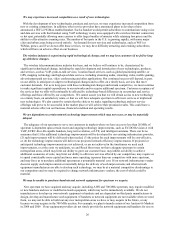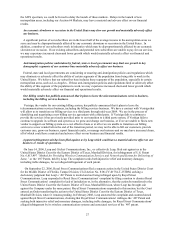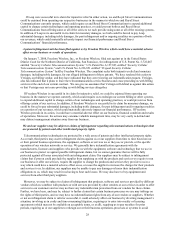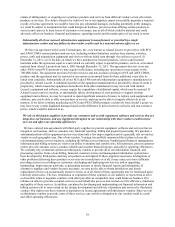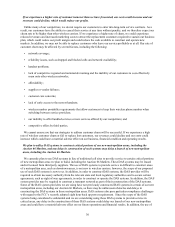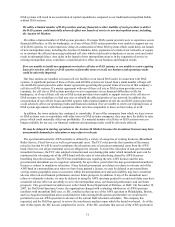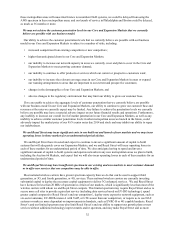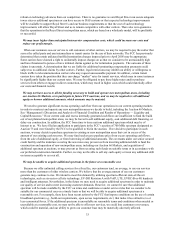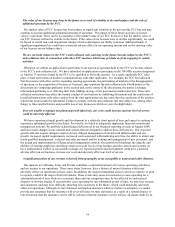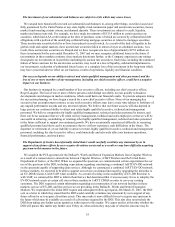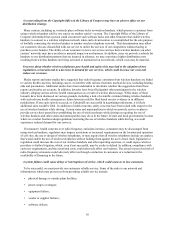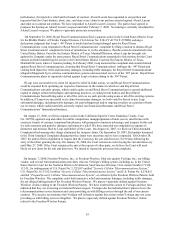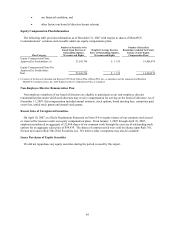Metro PCS 2007 Annual Report Download - page 47
Download and view the complete annual report
Please find page 47 of the 2007 Metro PCS annual report below. You can navigate through the pages in the report by either clicking on the pages listed below, or by using the keyword search tool below to find specific information within the annual report.36
A recent ruling from the Copyright Office of the Library of Congress may have an adverse effect on our
distribution strategy.
Many carriers, including us, routinely place software locks on wireless handsets, which prevent a customer from
using a wireless handset sold by one carrier on another carrier’ s system. The Copyright Office of the Library of
Congress determined that a person could circumvent such software locks and other firmware that enable wireless
handsets to connect to a wireless telephone network when such circumvention is accomplished for the sole purpose
of lawfully connecting the wireless handset to another wireless telephone network. This determination may allow
our customers who are dissatisfied with our service to utilize the services of our competitors without having to
purchase a new handset. The ability of our customers to leave our service and use their wireless handsets on other
carriers’ networks may have an adverse material impact on our business. In addition, since we provide a subsidy for
handsets to our distribution partners that are incurred in advance, we may experience higher distribution costs
resulting from wireless handsets not being activated or maintained on our network, which costs may be material.
Concerns about whether wireless telephones pose health and safety risks may lead to the adoption of new
regulations, to lawsuits and to a decrease in demand for our services, which could increase our costs and
reduce our revenues.
Media reports and some studies have suggested that radio frequency emissions from wireless handsets are linked
to various health concerns, including cancer, or interfere with various electronic medical devices, including hearing
aids and pacemakers. Additional studies have been undertaken to determine whether the suggestions from those
reports and studies are accurate. In addition, lawsuits have been filed against other participants in the wireless
industry alleging various adverse health consequences as a result of wireless phone usage. While many of these
lawsuits have been dismissed on various grounds, including a lack of scientific evidence linking wireless handsets
with such adverse health consequences, future lawsuits could be filed based on new evidence or in different
jurisdictions. If any such suits do succeed, or if plaintiffs are successful in negotiating settlements, it is likely
additional suits would be filed. In addition to health concerns, safety concerns have been raised with respect to the
use of wireless handsets while driving. Certain states and municipalities in which we provide service or plan to
provide service have passed laws prohibiting the use of wireless phones while driving or requiring the use of
wireless headsets and other states and municipalities may do so in the future. If state and local governments in areas
where we conduct business adopt regulations restricting the use of wireless handsets while driving, we could
experience reduced demand for our services.
If consumers’ health concerns over radio frequency emissions increase, consumers may be discouraged from
using wireless handsets, regulators may impose restrictions or increased requirements on the location and operation
of cell sites, the use or design of wireless telephones, or may require that all wireless telephones include an earpiece
that would enable the use of wireless telephones without holding them against the user’ s head. Such legislation or
regulation could increase the cost of our wireless handsets and other operating expenses, or could expose wireless
providers to further litigation, which, even if not successful, may be costly to defend. In addition, compliance with
such new requirements, and the associated costs, could adversely affect our business. The actual or perceived risk of
radio frequency emissions could adversely affect us through a reduction in customers or a reduction in the
availability of financing in the future.
A system failure could cause delays or interruptions of service, which could cause us to lose customers.
To be successful, we must provide our customers reliable service. Some of the risks to our network and
infrastructure which may prevent us from providing reliable service include:
• physical damage to outside plant facilities;
• power surges or outages;
• equipment failure;
• vendor or supplier failures;
• software defects;


